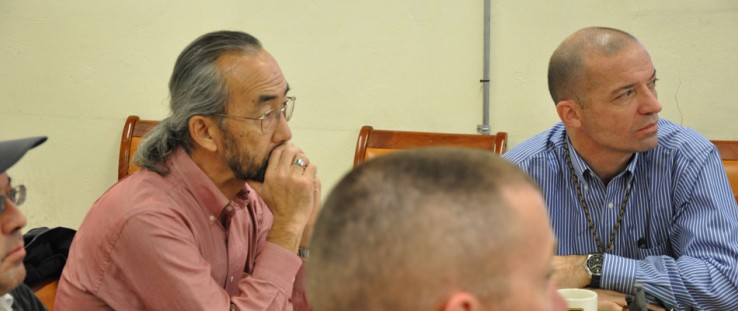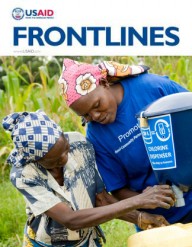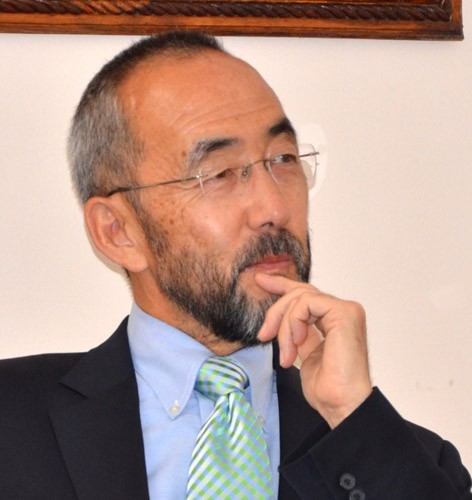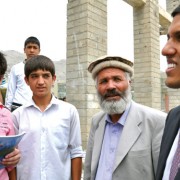 Former USAID Mission Director for Afghanistan Ken Yamashita attends a briefing with Kandahar Provincial Reconstruction Team members in November 2012.
U.S. Army Staff Sgt. Jeff Neff, U.S. Army
View More Photos
Former USAID Mission Director for Afghanistan Ken Yamashita attends a briefing with Kandahar Provincial Reconstruction Team members in November 2012.
U.S. Army Staff Sgt. Jeff Neff, U.S. Army
View More Photos
 Former USAID Mission Director for Afghanistan Ken Yamashita attends a briefing with Kandahar Provincial Reconstruction Team members in November 2012.
U.S. Army Staff Sgt. Jeff Neff, U.S. Army
View More Photos
Former USAID Mission Director for Afghanistan Ken Yamashita attends a briefing with Kandahar Provincial Reconstruction Team members in November 2012.
U.S. Army Staff Sgt. Jeff Neff, U.S. Army
View More Photos
I have worked with the military in Kosovo, in Colombia and in Afghanistan. I've also worked with law enforcement officers in Colombia and Peru. After those very different experiences, one of the things that clearly stands out to me is that security and development are two sides of the same coin.
We often talk about security and stability as one thing, and development and humanitarian assistance as another, but I would say from my experience you cannot break apart the two. It’s like trying to slice a coin in half. It is true that stability does not happen without development, but it is equally true that development does not happen without security and stability.
Twenty-five years of war have devastated the economy, institutions and people of Afghanistan. The U.S. Government, NATO and international partners have combined forces to support the Afghan Government in a civilian-military effort to secure and rebuild the country and combat terrorism. With more than $15 billion spent on development programs in Afghanistan since 2002, USAID is the largest provider of bilateral civilian assistance. And while we have a very close working relationship with the military, at times, coordination is not without its challenges.
Visualize a conference room where we are seated around a table with our military colleagues, and we are talking about priorities and strategies for a certain geographic region. And the concluding result from that meeting is that we all agree that the first priority intervention is to build a road. We have our part, and the military has their part—we are going to be lashed together to build this road.
We all leave the meeting feeling very good, because we've had this real melding of the minds and a joint understanding of the importance of true interagency cooperation—from a security and stability perspective and from a development perspective—of building that road. So we go off, and the military goes off and does their thing. And a month and a half later, they look around, they’ve cleared a path for the road and they are starting to put gravel down on the road, and USAID is nowhere to be found.
So the military is saying, “What the heck? I thought that we all agreed that this road was important.”
So we go back to a meeting, and they are not at all happy, and they say, “What happened? Where are you?”
So USAID says, in turn, “Well, the road continues to be important. But first, we need to have community buy-in. What we have been doing this past month is talking to the community and making sure that they have buy-in. You guys shouldn’t have been clearing the path for the road without the community. What if the community says that the road should have taken another path? Now you've ruined their crops and their farmland because you've started to put gravel down where you think the road should have gone.”
We need to be much more specific about timelines and tactics that each of us employ. For us, the concept of buy-in, the concept of long-term sustainability, the will of the people, is very important. For the military, the strategic importance of a road is paramount. Neither of us is wrong, but we need to constantly remind ourselves that just because we agree on a common objective does not mean that we agree on the tactics.
Time and again, I am in awe and respect the level of expertise that the military brings to the table. They love the development work. They want to be engaged, and they have technical expertise. Some have master's degrees in international relations, education or economics. Many have PhDs; some have even worked as city mayors before joining the reserves.
Between their knowledge and their experience, it’s an amazing resource to be able to tap. Once you get into a conversation with them, they really begin to open up. As they start to understand what we are about, in terms of the substance, they really get it.
It takes a lot of time and effort. It forces us to think outside the box and to walk into places that are uncomfortable for many of us. But I say that civ-mil engagement is the new normal. I say that this is going to be, time and again, our development challenge into the future. So, either we can be more effective by engaging, or we can flounder and be a failure.
If we are not willing and able to sit down and work closely with the military—not to worry. They outnumber us a hundred to one. They will figure out a way of doing it, and we will be sidelined.
The military highly respects our engagement and respects what we have to contribute. It is just astounding to me how often they reach out to all of my office and to all of our technical teams for input. They are hungry for input, and they respect the technical expertise that we bring to the table even though we are outnumbered.
I have absolutely no concerns about being overrun by the military. We have a preferred seat at the table, and they will always make room for us at the table. We just need to learn to take advantage of it.












Comment
Make a general inquiry or suggest an improvement.